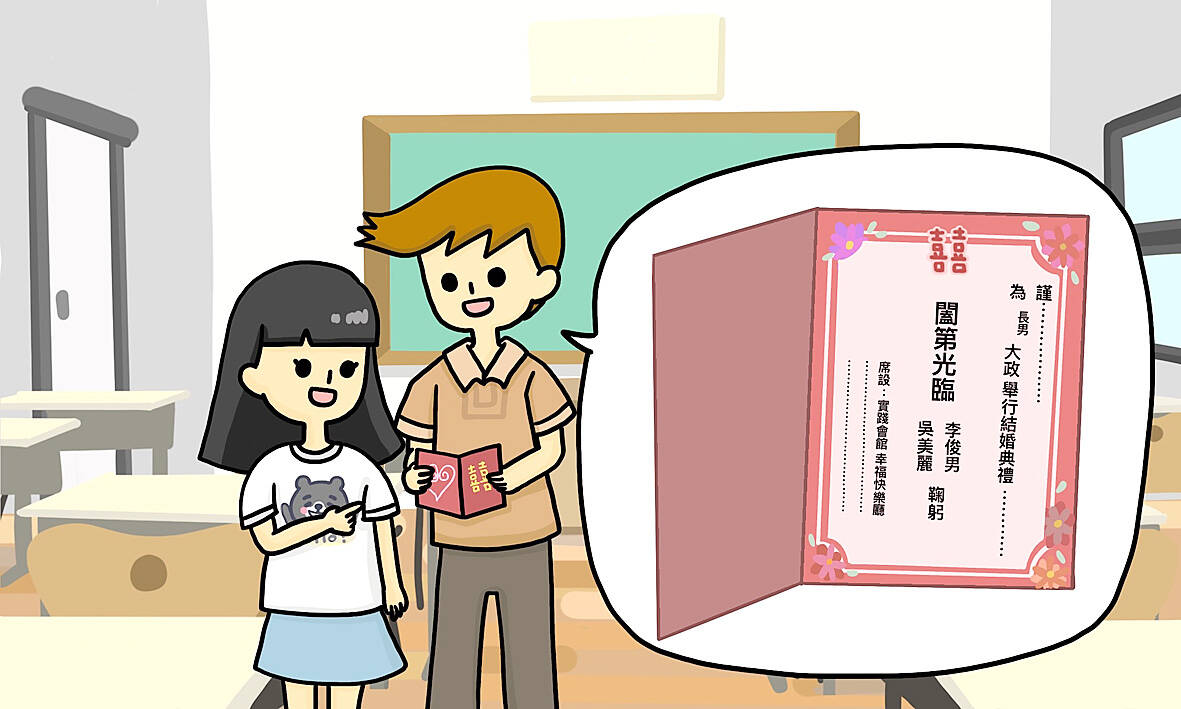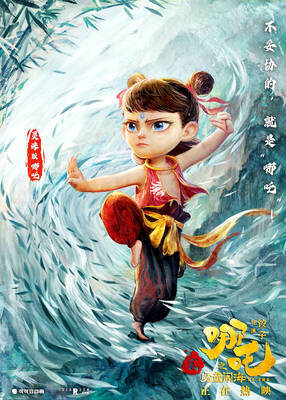對話 Dialogue
馬克:小實,你看!我收到這張喜帖,可是我不認識這兩個人。
Make: Xiǎoshí, nǐ kàn! Wǒ shōu dào zhèi zhāng xǐtiě, kěshì wǒ bú rènshì zhè liǎng ge rén.

小實:你不認識?我看看……你不認識「李大政」嗎?
Xiǎoshí: Nǐ bú rènshì? Wǒ kànkàn… Nǐ bú rènshì “Lǐ Dàzhèng” ma?
馬克:李大政?我認識啊!可是這裡寫的是「李俊男」?
Make: “Lǐ Dàzhèng”? Wǒ rènshì a! Kěshì zhèlǐ xiě de shì “Lǐ Jùnnán”?
小實:喔!李俊男是你朋友的爸爸,你看這裡寫了「大政」兩個字。
Xiǎoshí: Ō! “Lǐ Jùnnán” shì nǐ péngyǒu de bàba, nǐ kàn zhèlǐ xiěle “Dàzhèng” liǎng ge zì.
馬克:真的!不過,為什麼他結婚,喜帖上要寫爸爸的名字?
Make: Zhēnde ye! Búguò, wèishénme tā jiéhūn, xǐtiě shàng yào xiě bàba de míngzi?
小實:這個叫「署名」,在傳統的喜帖裡常常是爸爸、媽媽署名。
Xiǎoshí: Zhèige jiào “shùmíng”, zài chuántǒng de xǐtiě lǐ chángcháng shì bàba, māma shùmíng.
馬克:因為是爸爸、媽媽出錢嗎?
Make: Yīnwèi shì bàba, māma chūqián ma?
小實:這麼說也可以,因為爸爸、媽媽署名表示由他們邀請客人參加。
Xiǎoshí: Zhème shuō yě kěyǐ, yīnwèi bàba, māma shùmíng biǎoshì yóu tāmen yāoqǐng kèrén cānjiā.
馬克:原來是這樣啊,我懂了!
Make: Yuánlái shì zhèyàng a, wǒ dǒngle!
翻譯 Translation
Mark: Xiaoshi, look! I got this wedding invitation, but I don’t know who these two people are.
Xiaoshi: You don’t? Let me have a look. . . so you don’t know who Lee Ta-cheng is?
Mark: Lee Ta-cheng? I know who he is, but it says Lee Chun-nan.
Xiaoshi: Oh! Lee Chun-nan is your friend’s father, you can see the characters “Ta-cheng” written here.
Mark: Yes, but why did he write his father’s name on the wedding invitation when he is the one getting married?
Xiaoshi: This is called the “shuming.” It is often signed by the mother and father in traditional wedding invitations.
Mark: Is it because mom and dad paid for it?
Xiaoshi: You could say that, since the signature means that father and mother will invite guests to attend.
Mark: Oh, I see. I got it!
單字片語 Vocabulary
1. 喜帖 (xǐtiě) wedding invitation
2. 結婚 (jiéhūn) to marry; marriage
3. 署名 (shùmíng) signature
4. 傳統 (chuántǒng) tradition
5. 出錢 (chūqián) to pay, to give money
6. 表示 (biǎoshì) to express, to mean
7. 邀請 (yāoqǐng) to invite
教材音檔 Audio Files
教材影片 Video Files:
https://www.instagram.com/celc.nou_tw/guide/_/17999106352646292/
實踐大學華語中心提供
By Shih Chien University Chinese Language Center: https://chineseusc.com/

A: China’s animated blockbuster “Ne Zha 2” also smashed a box office record recently. B: It’s No. 7 among the world’s best-selling films, grossing more than US$2 billion globally. A: I t has even become the world’s highest-grossing animated film, while the political metaphors in it are causing controversy. B: But who is Ne Zha anyway? A: Ne Zha, often spelled as “Nezha,” is actually a mythical teenage deity with superpowers. A: 中國動畫片《哪吒2》最近也打破紀錄。 B: 該片已衝上影史票房排行榜第7名,全球狂賣超過20億美元。 A: 聽說它甚至是全球最賣座的動畫片,影片中的政治隱喻卻引爆爭議! B: 但哪吒是誰? A: 哪吒的名字常被拼成「Nezha」,是神話中具有超能力的青少年神明。

People desire a sense of purpose in their lives, but they often remain idle unless they have a clear reason to act. This concept is illustrated by the retirement paradox. People work hard to prepare for a future without work but find life meaningless after achieving that goal. A study was carried out to determine if a reason, even a minor one, could encourage idle people to take action. __1__ Upon finishing the first, they were instructed to drop it off at a location either right outside the room or at a spot farther away, which would take around

Microsoft on Feb. 28 announced it was retiring Skype, the online voice and video call pioneer that the tech titan acquired in 2011. “Starting in May 2025, Skype will no longer be available,” said a post from Skype support on X, directing users to sign into Microsoft’s Teams platform for further use of its services. Skype was founded in 2003 by Scandinavians Niklas Zennstrom and Janus Friis in Estonia, revolutionizing Internet communication by offering free voice calls between computers and affordable rates for calls to landlines and mobile phones. Over the years, and as Internet speeds improved, Skype evolved to

A: Were there any highlights at the Oscars this year? B: With 13 nods, French director Jacques Audiard’s “Emilia Perez” broke the record for most Oscar nominations earned by a non-English film. A: Wow, it broke the record of 10 Oscar nominations set by Taiwanese director Ang Lee’s “Crouching Tiger, Hidden Dragon.” B: On the eve of the Oscars, Lee was honored with the Lifetime Achievement Award at the Directors Guild of America (DGA) Awards. A: It seems that Hollywood has finally become more diverse. A: 今年的奧斯卡獎有什麼亮點嗎? B: 法國導演賈克歐迪亞的《璀璨女人夢》榮獲13項提名,打破了非英語片紀錄! A: 哇打破了台灣導演李安的《臥虎藏龍》10項提名紀錄。 B: 李安則在奧斯卡前夕,獲頒美國導演工會「終身成就獎」。 A: 看來好萊塢終於比較多元化啦。 (By Eddy Chang, Taipei Times/台北時報張迪)